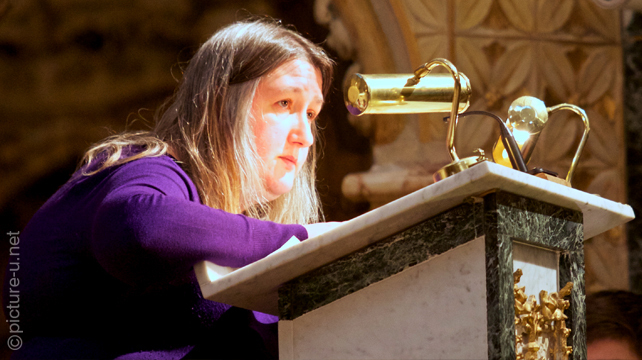
Speaking Personally: Louise Zanre
Louise Zanre
Louise has worked for Jesuit Refugee Service UK for over thirteen years, 11 of which as Director. Prior to that she worked with Pax Christi. In the past she has been the Chairperson of the National Catholic Refugee Forum and the treasurer of the Asylum Rights Campaign. She currently sitson the steering group of the Churches Refugee Network and is a member of the advisory body to the Jesuit Refugee Service Europe Regional Director.
Where do you think your commitment to justice and peace comes from?I suspect it’s a mixture of different things. Family background has a lot to do with it. My parents encouraged us to think in a socially minded way about things. As a child I was encouraged to give one of my gifts to the local orphanage in Edinburgh, and at Easter time I helped my father bring stocks of Easter eggs to the orphanage. But there was also encouragement to think about what it would mean to be in that person’s situation, what we would like people to do for us. The other part of it was growing up in the central belt of Scotland at the time of the Northern Ireland Troubles, which had a huge impact on behaviour in that part of Scotland in particular. I remember at the time of the Anglo-Irish Agreement there were an awful lot of fights between adults but also between students at the local non-denominational school and Catholic school, culminating at one point in a full blown riot on the main road to Edinburgh. I remember seeing teenagers trying to kill each other, fighting on top of buses, on top of lorries, taking bricks to each other. I thought to myself at that point that this isn’t religion, religion is being used as an excuse here and there must be a better way forward. That was the reason why I then went on to study Law, and that conviction that there has to be a better way was why I then went to work in the faith based charitable sector.
What for you are the most important areas of concern today
I suppose, generally speaking, it’s the growth of individualism, a sense that everything is alright as long as I’m alright. A lot less thought is given to the effects of policies or decisions or behaviour on other people around us. When it comes to my professional work, a lot of the things that exercise us most at JRS are the result of that individualism gone rampant with respect to immigration policy and particularly to the effect on people who are fleeing human rights abuses and seeking asylum here. I see that manifested in an overuse of austerity as a reason why it’s acceptable to limit services or assistance for people in marginalised groups, without an understanding that there should be a discussion about what’s most appropriate for our society to be funding. So for example no-one ever says ‘Where shall we find money for Trident?’ rather than ‘Where shall we find money for the Health Service?’
The current Immigration Bill going through Parliament has several things in it that are of concern. One of them is access to primary health care. The reason why it’s in the bill is because the Government feels there’s a lot of ‘health tourism’ into the UK. In fact the statistics show less than 0.01% are health tourists in the strict sense of the word, but the effects of the measures will be to deny anyone who does not have
Indefinite Leave to Remain in the UK or is not an EU citizen from having access to GP surgeries. That has implications not only for the destitute asylum seekers we are working with at JRS but also people from religious orders who are here on ‘minister of religion’ visas. That shows another problem of society to do with misuse of financial reasons for justifying some of these policies. There is no consideration whatsoever of other values that people bring to society. Just because someone isn’t paying tax doesn’t mean that they aren’t being of benefit to society, that they’re not sharing their skills or talents or fulfilling a useful function, whether it’s the minister of religion carrying out pastoral duties or a destitute asylum seeker volunteering for charities or in the NHS. It’s a fundamental skew of basic values within our society.
What sustains you in your commitment?
People! People I come across – refugees, members of parishes where I go to speak, meeting people who wouldn’t otherwise have the help that we are able to offer, or who share concerns and are able to derive mutual support from each other. And my colleagues, the volunteers who help here, they are living manifestations of the goodwill in society.
What are your hopes for a Church like ours for the 21st Century?
It’s a mix of different things. A lot of hope has been given for the Church by Pope Francis giving personal witness in his concern for those who are marginalised, those who are isolated, those who are poor. That really speaks to my own personal convictions, about where I should be putting my energies. And it really speaks to a wider hope too, that in some way it is institutionalising a concern for the poor beyond the theological rhetoric. Having the theology, having Church social teaching is fantastic and it’s great to have that underpinning, but to have it enacted at the highest level in the Church, to have that basic concern manifested, is really encouraging, really gives hope and life to the Church going into the future.



